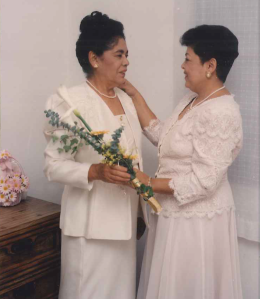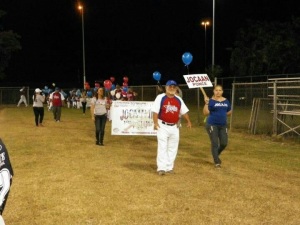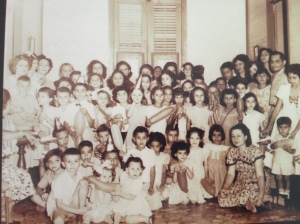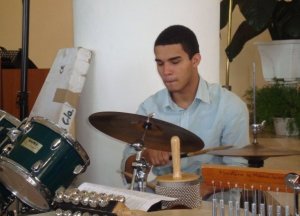By: Andrés R. Cardona
Located in Mayaguez, the Hogar Albergue Jesús de Nazaret is managed by its most recent director Lidia Méndez. She has obtained the position just nine months ago. She says this tiredly but with great warmth, having patiently waited after the end of what was another hard day of work.
Her office is neat, clean and organized. The walls are covered with thank you drawings and messages from the children, posters of Minnie Mouse and religious messages. The calendar on the side is filled in with all sorts of events, hinting at how busy she usually is. She has a separate desk for her computer, while the desk she sits at has several small stacks of papers and documents as well as dolls. However there is nothing blocking the view to her, as she keeps the center of her desk clear of papers.
When asked why she decided to work there she said “I’ve always liked serving.” She also mentioned that it was the same reason that she became a social worker by profession.
“I was a social worker for 32 years” she said. For 13 of those years, she was also doing volunteer labor at the Hogar.
The Hogar Albergue Jesús de Nazaret is a non-profit, aimed at providing shelter for kids up to 11 years of age who have come from abusive, negligent or otherwise unfitting homes. They protect and heal the children brought into their care, usually by referral from the Department of the Family, for a period of 90 days.
Méndez explains that the institution was originally founded by Jesús Morales and his wife, Carmen Rodríguez. He wished to make an orphanage, but his wife convinced him that a home for mistreated children, of which there were many in the west, would be a better idea.
The Hogar’s location belonged to an organization consisting of citizens with the interest of analyzing the people’s needs. Morales and his wife belonged to this group and granted them the land for their plans.
According to their brochure, the services they provide to the children include food, medical care, transportation, recreation, education at both elementary and pre-school levels, social assistance and psychological therapy.
As it stands, the institution is rather small. It consists of two buildings with a playground in between.
The first building serves administrative purposes. Méndez’s office is here, as is the social worker’s and the psychologist’s. Also found here are the educational area and the employee break room.
The playground is average-sized. It is padded and contains a plastic playground set, with enough space to spare for their large collection of bicycles and toys strewn about the fence and ground.
Next to that is the second building which they call La Casita. It is here where the children reside and are cared for. It’s got a diner on the bottom floor, and washrooms, bedrooms and a small common area on the main floor.
“We receive calls every day for new children to be brought in” Méndez said. “About 1 to 2 calls each day.”
Méndez mentions that she wishes to expand “one of these days, but we still have achieved it.” She wishes to be able to have room for more children and facilities for their care and entertainment.
Currently, there seem to be no volunteers working there. There are, however, several people under the Hogar’s employment.
“We have” Méndez says, “11 nanas, two cooks, one driver, one social worker, one office assistant, one psychologist that comes one time a week, and one accounting assistant.”
These employees have nothing but respect for their boss.
Lillian Cruz, age 48, is the accounting clerk for the Hogar. She’s been working there since October 4, 1997, roughly 15 years and a half.
“[Méndez] started in the board of directors 13 years ago.” Cruz says, referring to the board consisting of 11 members that oversees the Hogar. “She revoked the presidency and, since November 2012, she’s been serving as director”
“I work very well with her. We have very good communication.” She adds. “The employees, we all consult with her and she tells us if we can or if we can’t or she gives another alternative for every situation that arises.”
Yolanda Santariz, 48-year-old child caretaker of 2 years, and Felipa Ayala, 65-year-old cook for 18 years, also had nothing but praise to offer the director.
“Tremendous person” says Santariz. “Tremendous person” Ayala repeats. They then, accompanied by Cruz, start listing all sorts of praise for the dear director.
They mention how she has so much capacity to do her job, how she stays after hours and is on call, as well as calls in herself even during her time off to check on the children, whom she worries about very much, according to them.
Méndez was born in Mayaguez, 57 years ago. She mentions that she had a nice childhood. Her parents were kind and she was raised with Christian values. Her family is united. She mentions it has some problems, but they are managed.
Despite her comparably privileged upbringing, she does her best to understand how hard the transition is for the children brought into her care. She says that “Every [special] moment stays with the children.” She is happiest when the children are smiling, happy and open.
Méndez mentions that if people wish to help, they accept donations of food and toys. However, she notes that the most helpful things are organized events to obtain funds for the Hogar. Volunteer work is also welcome and encouraged.
Anyone interested in more information are encouraged to call them at their phone number, (787) 831-6161.





















